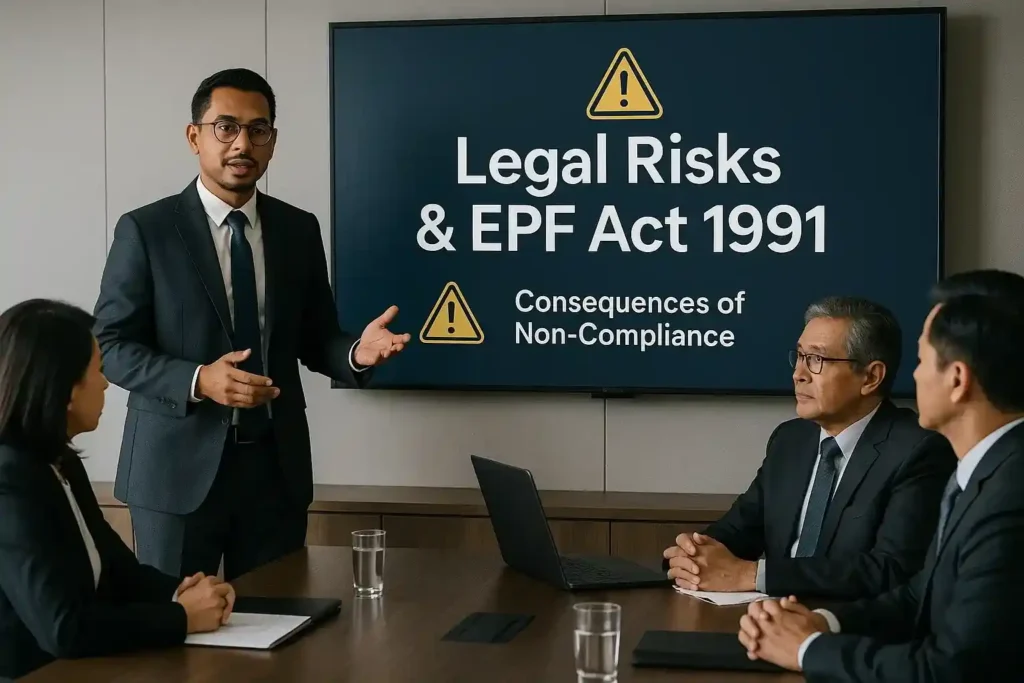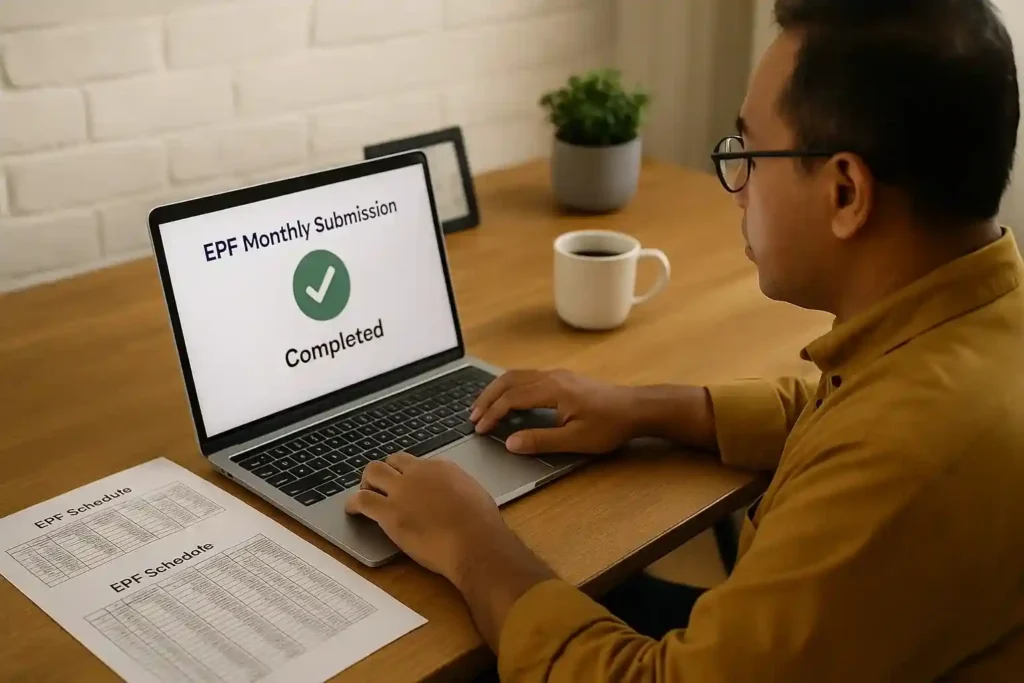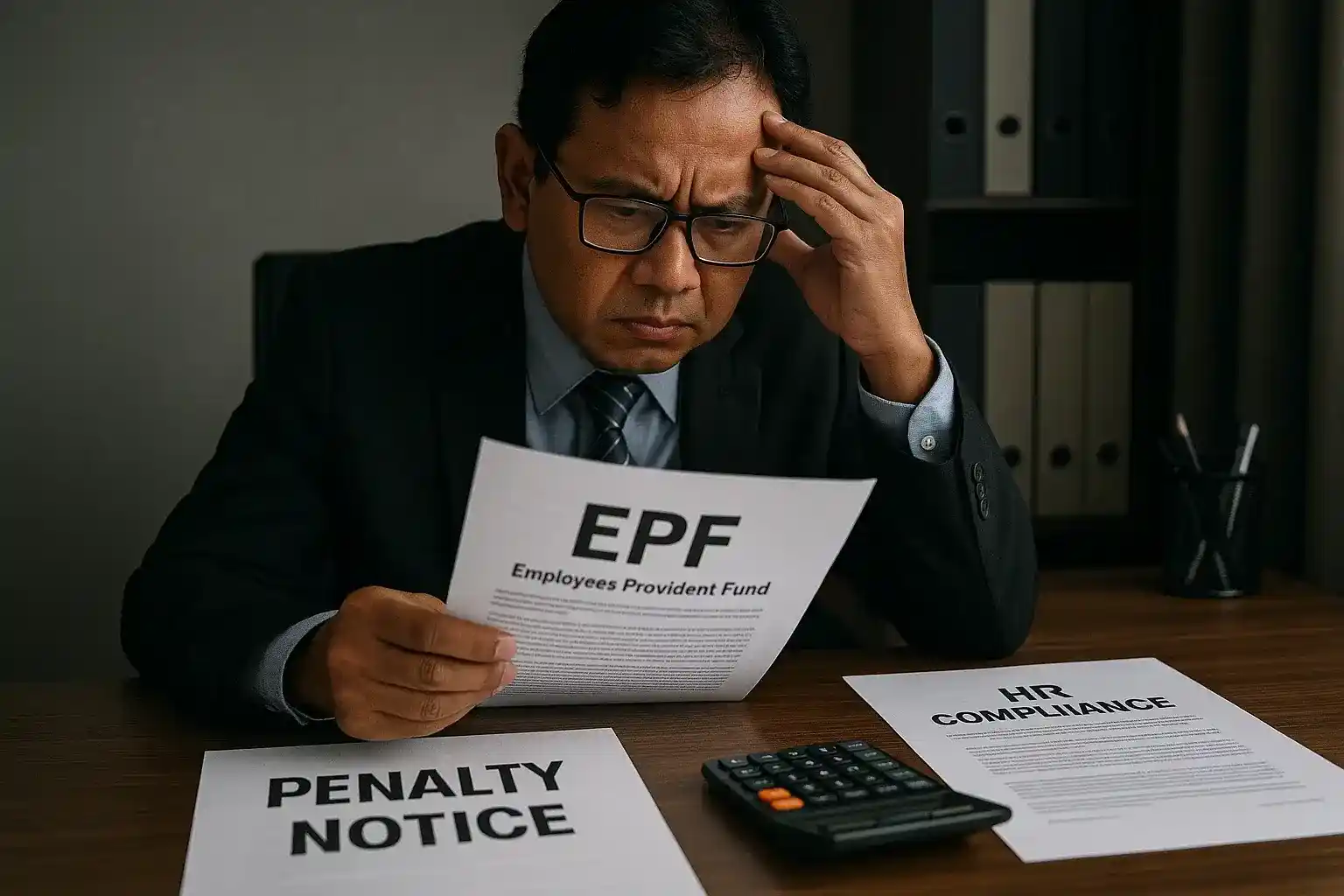3 Key Takeaways:
- Many Malaysian employers face legal consequences due to incorrect or late EPF company contribution practices.
- Knowing the most common mistakes and compliance requirements can prevent costly penalties.
- Employers must adopt preventative strategies and digital tools to ensure EPF accuracy and compliance.
EPF company contribution mistakes have led to significant penalties for at least six Malaysian companies in recent years, sparking concern across the business community.
For many employers, contributing to the Employees Provident Fund (EPF) may seem like a straightforward statutory obligation—but even minor errors in calculation, submission, or compliance can trigger serious legal consequences.
From financial penalties to reputational damage, the cost of getting it wrong can be devastating for businesses both large and small.
Upskill Staf Anda: Bina Website Mesra SEO
Bengkel praktikal 2 hari untuk bina laman web syarikat yang kemas, pantas, dan mudah diurus.
Domain + Hosting + Elementor Pro PERCUMA 1 tahun

This article explores why these mistakes continue to happen despite clear regulations by KWSP (Kumpulan Wang Simpanan Pekerja).
It also aims to equip Malaysian business owners, HR personnel, startup founders, and payroll professionals with the insights and tools necessary to avoid falling into the same trap.
As Malaysia moves towards increased digital transparency and automation, companies that fail to modernize their payroll systems or train their staff accordingly often end up facing avoidable fines or legal challenges.
Understanding EPF compliance is no longer just a matter of paperwork—it reflects your business’s professionalism, reliability, and care for employees’ welfare.
With growing attention from authorities and employees alike, businesses must now treat EPF contribution accuracy as a top compliance priority.
Whether you’re running an SME, launching a startup, or expanding your team, this article will walk you through the most common EPF errors made by employers, why companies are being penalized, what the law says, and most importantly—how to prevent these mistakes in your own organization.
Through real-life examples, expert tips, and actionable strategies, you’ll learn how to protect your company from costly missteps while fostering trust among your employees.
Let’s dive into the key issues and find out what every employer in Malaysia needs to know about EPF company contributions.
Key Benefits of Understanding EPF Company Contribution Penalties

Why This Topic Matters for Malaysian Businesses and Startups
Understanding EPF company contribution compliance is crucial for any business operating in Malaysia.
The consequences of non-compliance can impact:
- Business Reputation – Late or incorrect contributions affect employee trust and public perception.
- Financial Health – Penalties, compound interest, and legal fees can drain resources.
- Legal Standing – Repeated violations may trigger investigations or court proceedings.
For startups and SMEs especially, early mistakes can set a dangerous precedent and hinder growth opportunities.
How Compliance Improves Long-Term Business Health
Staying compliant with EPF company contribution regulations ensures:
- Stable HR operations
- Better staff retention and morale
- Easier access to financing and partnerships
A proactive approach to EPF also reflects strong business governance, which attracts investors and collaborators.
Additional Factors to Consider
- EPF compliance affects SOCSO, EIS, and HRDF eligibility
- Annual audits by LHDN or KWSP may include EPF compliance checks
- Using trusted payroll software minimizes human error
Common Challenges in EPF Company Contribution Compliance
What Are the Biggest Obstacles?
Despite good intentions, companies face various challenges, including:
- Outdated payroll systems
- Lack of internal EPF knowledge
- Changing EPF contribution rates
- Manual calculation errors
Even established businesses often fail to realize they’ve made recurring errors—until it’s too late.
How to Overcome These Challenges
To avoid penalties:
- Automate payroll processes
- Stay updated with KWSP circulars
- Assign a compliance officer or outsource to experts
- Train HR/admin staff on latest EPF changes quarterly
Best Practices for Avoiding EPF Penalties

Actionable Tips for Success
- Automate Contributions – Use certified software with EPF integration.
- Set Internal Deadlines – Aim for the 10th of each month to avoid last-minute issues.
- Cross-Check Contribution Rates – Reference official KWSP guides regularly.
- Audit Payroll Monthly – Conduct an internal check before payment submission.
Tools & Resources to Help You
- KWSP i-Akaun: Employer portal for contribution tracking
- Socmad.com Payroll Templates: For SMEs and digital-first companies
- Piktochart: To visualize EPF processes for employee awareness
1. Mandatory Employer Registration and Compliance Requirements
Failure to Register and Its Consequences
Some startups delay EPF registration, thinking it only applies when they hire multiple staff. However, failure to register within 7 days of hiring the first employee violates the EPF Act 1991.
Actionable Tips:
- Register on the KWSP i-Akaun Employer portal as soon as hiring begins
- Keep a digital and printed copy of your EPF registration confirmation
- Assign one staff to manage statutory obligations
2. Common EPF Contribution Mistakes by Employers
Calculation Errors, Rate Mismatches, Late Payments
Many companies either apply outdated contribution rates or miss deadlines.
For example, paying below the statutory 13% (for employees earning RM5,000 and below) is a clear violation.
Actionable Tips:
- Download the latest rate table from KWSP’s website quarterly
- Mark recurring reminders in Google Calendar or HR system
- Pay at least 2–3 working days before the 15th
3. Legal Penalties for Non-Compliance with EPF Contributions

Fines, Compound Charges, and Legal Proceedings
Under Section 43(2) of the EPF Act, employers failing to remit contributions can be fined up to RM10,000 or imprisoned for up to 3 years—or both.
KWSP also imposes interest and dividend charges on the overdue amount.
Actionable Tips:
- Maintain digital payment proof and records for 7 years
- Assign a consultant to conduct annual statutory health checks
- Subscribe to KWSP alerts for policy changes
4. Real-Life Cases of EPF Contribution Failures
What Happened to 6 Malaysian Companies
Recent reports show six companies being penalized in 2024 alone, including those in manufacturing, logistics, and F&B industries.
Most were fined for deliberate late submissions and misreporting contribution values.
Actionable Tips:
- Study enforcement news on official KWSP or Bursa channels
- Benchmark your internal EPF timelines with competitors
- Create a culture of proactive compliance within HR
5. Steps to Rectify EPF Contribution Errors
Rectification, Voluntary Disclosure, and Appeals
KWSP offers a grace mechanism for errors through Form KWSP 8D, which allows for voluntary adjustment.
Early disclosure can reduce penalties.
Actionable Tips:
- Submit Form 8D with complete breakdowns
- Email the local KWSP officer for faster rectification
- Keep a summary sheet for all backdated adjustments
6. Preventative Measures for Employers to Ensure EPF Compliance

Building a Proactive EPF Compliance Culture
EPF compliance should be part of your onboarding, SOPs, and HR audits.
Actionable Tips:
- Include EPF briefing in new staff orientation
- Run quarterly internal audits
- Use visual tools like flowcharts to simplify process understanding
Final Reflections on EPF Compliance in Malaysia
EPF company contribution mistakes may seem minor at first glance, but the financial and reputational damage they cause can be substantial.
As we’ve seen from recent cases involving six Malaysian companies, overlooking compliance is no longer an option in today’s business environment.
Whether you’re a startup founder, HR manager, or business owner, understanding your statutory obligations—and acting on them—is key to staying ahead.
By learning from others’ mistakes and following best practices, you can ensure your business remains secure, credible, and compliant.
Need expert help to stay compliant and avoid costly EPF mistakes?
At MUSTRE, we specialize in HR advisory, payroll management, and statutory compliance for Malaysian businesses.
✅ Get personalized consultations
✅ Ensure your EPF, SOCSO & EIS compliance is up-to-date
✅ Let our experts handle your submissions and audits
💬 Contact us today and safeguard your business from unnecessary penalties.
Soalan Lazim (FAQ)
1. What is an EPF company contribution and who is responsible for it?
An EPF company contribution is the amount an employer is legally required to pay into the Employees Provident Fund on behalf of their employees.
In Malaysia, employers contribute a percentage of the employee’s salary (usually 13% or 12% depending on salary bracket) monthly.
It is the employer’s responsibility to calculate and submit this payment correctly and on time.
2. What happens if my company misses the EPF company contribution deadline?
Missing the deadline for EPF company contribution can result in fines, late payment interest, and legal action.
Employers must make the contribution by the 15th of the following month.
Repeated delays may trigger audits and additional penalties from KWSP.
3. How do I know if my company is making the correct EPF company contribution?
You can verify the EPF company contribution by logging into the KWSP i-Akaun (Employer) portal and reviewing payment history.
Also, ensure you’re using the latest official EPF rate tables and confirm your payroll software calculates the correct percentage based on employee earnings.
4. Can past EPF company contribution mistakes be corrected?
Yes, employers can rectify past EPF company contribution errors by submitting Form KWSP 8D to declare the corrected amounts.
Early voluntary disclosure often reduces the risk of penalties.
Always maintain proper documentation to support the corrections.
5. What tools or services help avoid EPF company contribution issues?
To avoid EPF company contribution problems, use EPF-compliant payroll software, set automated payment reminders, and consider outsourcing to HR service providers like MUSTRE who specialize in payroll and statutory compliance.








